Get our independent lab tests, expert reviews and honest advice.
Online will kits compared: Pros, cons and what you need to know

Need to know
- Will kits allow you to prepare your own will and plan what's going to happen to your assets after you die
- We look at six popular online will kits to investigate the good and bad points of each
- Will kits can be a good option for simple circumstances, but consult a lawyer if you have complicated family or financial arrangements
On this page:
- What is a will and what is a will kit?
- Who should use a will kit?
- Will kit comparison
- Tips for preparing a will
- When should you get legal advice for your will?
- Will kits and your data
Having a valid will is important. Passing away without one is called “dying intestate” and means the things you own will be distributed according to a formula set by government legislation, and certain relatives will receive a defined percentage of your assets, despite what you may have wished.
If you’ve recently become will-curious and have done some research online, you might have come across various services offering will kits that you can fill out yourself.
Some of these are interactive processes that quiz you about your circumstances, while others are standard documents that ask you to fill out various sections.
But could they work for you? And if so, which ones will help you prepare a better will?
What is a will and what is a will kit?
What is a will?
A will is a legal document that states how you want your estate to be distributed after you die.
Your estate encompasses anything you own under your name, and here arises the first common sticking point in the process.
“Often people sit down to make a will and they think they own assets that they don’t actually own,” says Andrew Simpson, wills and estate lawyer and author of The Australian Guide to Wills and Estate Planning.
“What is an estate is a fairly simple question, but to actually get to the bottom of that can be complicated in some instances,” he explains.
“Often it requires title searches on property because [the will-maker] thinks they own it, but they actually own it jointly with somebody else or they own a proportion of the property and not the whole property. Sometimes [an asset is] owned in a family trust.”

What is a will kit?
Will kits allow you to prepare a will whenever and wherever you want, as opposed to sitting down with a lawyer to start one from scratch. Even though they’re completed without legal advice, they can allow you to prepare a standard legal will.
And while some are straightforward forms offering relatively little background information or explanation of terms, others go into comprehensive detail on what you should know and be considering as you plan your estate.
Most of these DIY products that CHOICE saw in the past were paper-based, meaning they were documents with pre-prepared sections that users downloaded from a website and filled out by hand.
While these are still available, we’re now seeing more purely digital and interactive portals that ask you questions about your family and assets to tailor the will-building process to you.
Our experts concluded all would allow a relatively well-informed user to create a standard will
All six of the will kits we used for this comparison were available online and some were free while others cost between $30 and $159 for the whole process.
While some were better on some points than others, our experts concluded all would allow a relatively well-informed user to create a standard will.
Who should use a will kit?
Andrew Simpson says will kits are good for people whose affairs are straightforward and less suitable for people with multiple children from previous partners, for example, or complex financial arrangements.
“Will kits are only suitable for the simplest of circumstances … where the will-maker clearly owns all of their assets personally,” he says.
“They’re typically not suitable for a blended family, so [they’re better] if you’ve got a fairly straightforward family structure and your wishes are straightforward.”
Will kit comparison
We asked three lawyers a series of questions about six popular online DIY will kits.
While all lawyers said each of these kits will allow a user to prepare a standard will, they were in agreement on some areas where each kit could have done better.
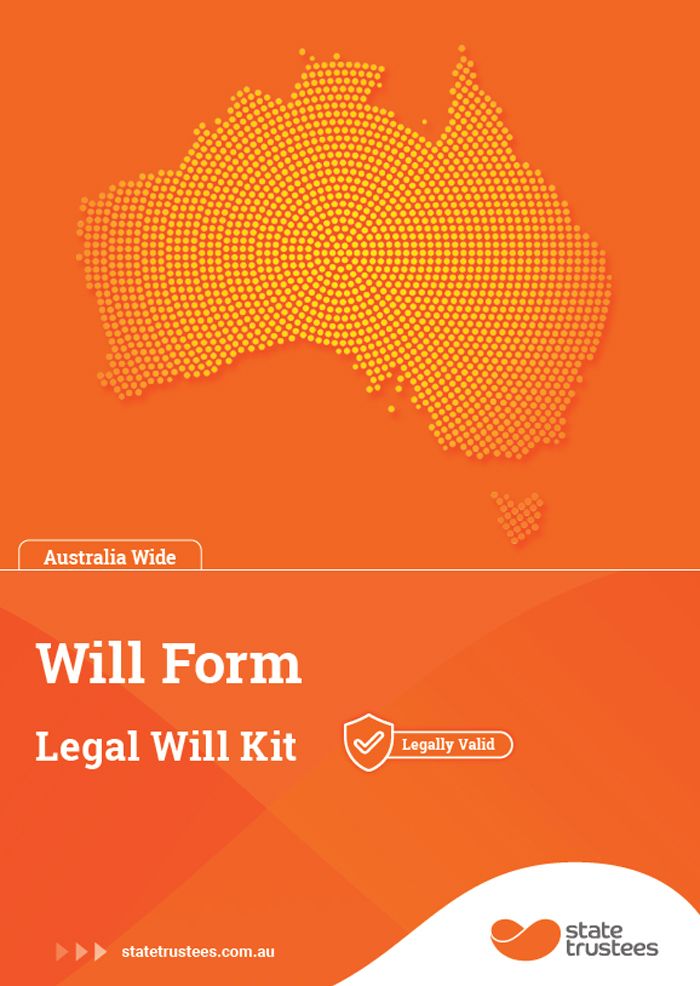
1. Victorian State Trustees
Type: Paper-based
Cost: $39
Website: statetrustees.com.au
Good points
- Structure is easy to follow.
- Provides adequate instructions in most parts, with an example will to follow.
- Gives clear instructions on when you should seek expert advice.
Bad points
- Instructions could be clearer in some sections.
- Does not deal with taxation adequately (see more on the relevance of tax later in this article).
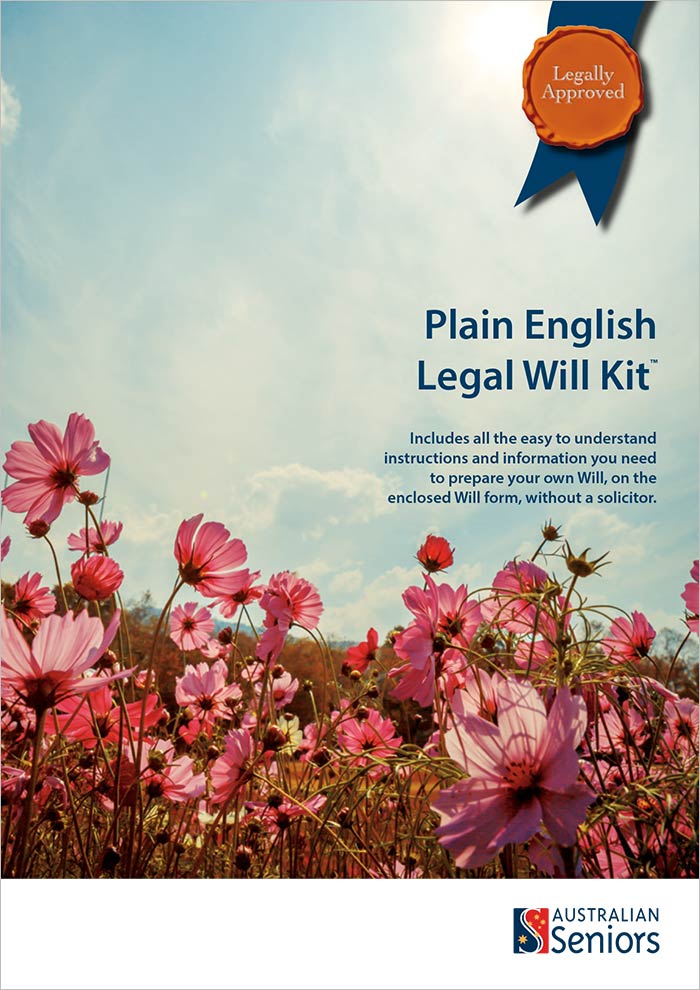
2. Australian Seniors
Type: Paper-based
Cost: Free
Website: seniors.com.au
Good points
- Provides adequate instructions and an easy-to-follow structure.
- Adequately deals with choosing an executor.
- Describes when the will kit is suitable and gives instructions on when you should seek expert advice.
Bad points
- Doesn’t deal with superannuation adequately (see more on the relevance of superannuation later in this article).
- Could provide more information on taxation.
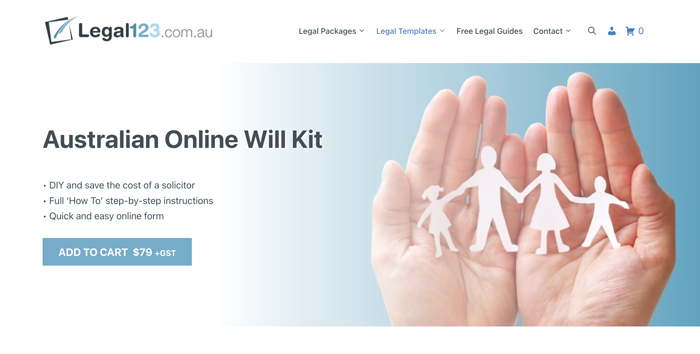
3. Legal 123
Type: Online, asks you to fill out pre-arranged sections
Cost: $86.90
Website: legal123.com.au
Good points
- Structure and instructions are easy to follow.
- Provides a useful instructional video.
- Adequately deals with choosing an executor.
Bad points
- Makes no reference to superannuation.
- Doesn’t deal with taxation adequately.

4. Law Depot
Type: Online, questionnaire
Cost: Free
Website: lawdepot.com
Good points
- Doesn’t assume any prior knowledge.
- Structure is easy to follow.
- Adequately deals with choosing an executor.
Bad points
- Doesn’t give clear instructions on when you should seek expert advice.
- Only provides limited guidance on superannuation.
- Makes no reference to taxation.
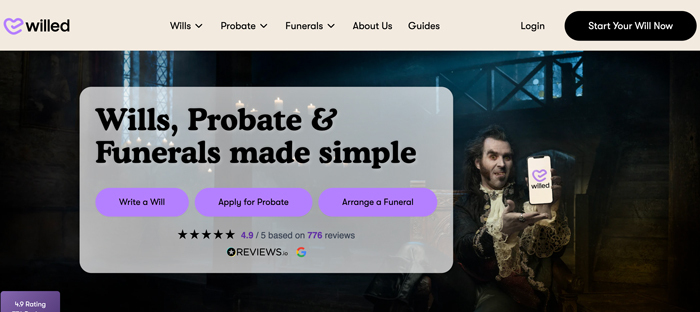
5. Willed
Type: Online, questionnaire
Cost: You can begin the process for free, but you will need to pay $159 (for one person) to finalise preparation of your will.
Website: willed.com.au
Good points
- Doesn’t assume any prior knowledge.
- Instructions and structure are easy to follow.
- Adequately deals with issues relating to children.
- Adequately deals with choosing an executor.
Bad points
- Doesn’t include clear instructions on when you should seek expert advice.
- Doesn’t provide any information on taxation.
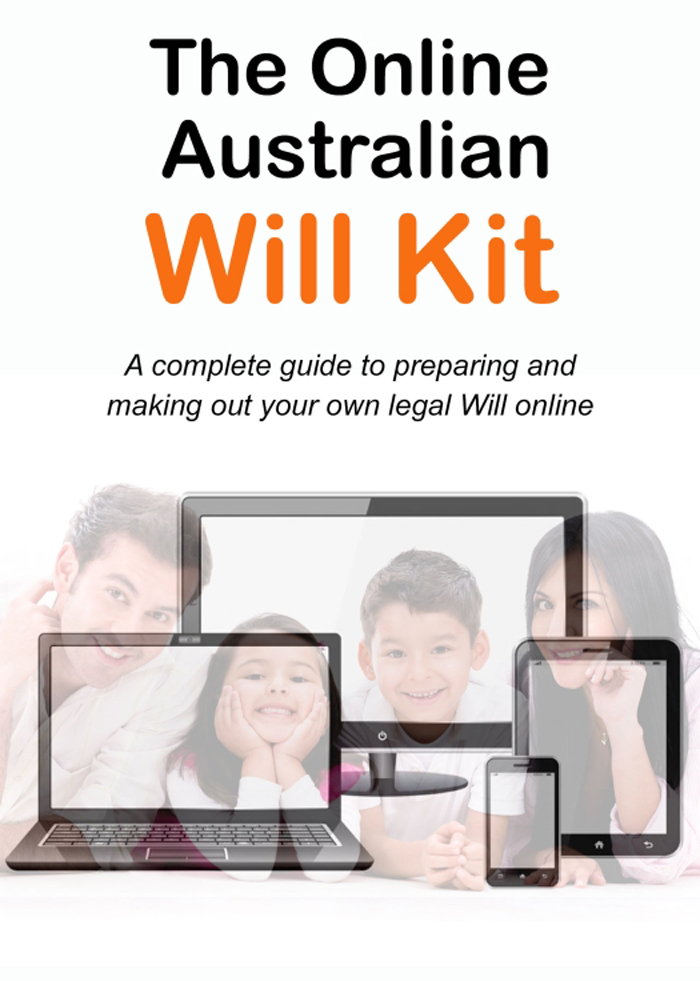
6. The Online Australian Will Kit
Type: Online, asks you to fill out pre-arranged sections
Cost: $49.95 (available on special for $29.95 at time of writing)
Website: theaustralianwillkit.legal
Good points
- Doesn’t assume any prior knowledge.
- Provides useful background information and clear instructions.
- Adequately deals with issues relating to children.
- Adequately deals with choosing an executor.
Bad points
- Accessing the will kit and supporting documents via the product’s website can be difficult. For example, there’s a limit to how many times you can download and view the forms after you’ve purchased them.
For these assessments, it’s assumed the will-maker reads all the material provided in full. Each will kit was reviewed by three external legal experts. They looked at the structure of each kit and the guidance offered regarding children, the executor, superannuation and taxation. They also confirmed whether each kit would enable a relatively well-informed user to successfully complete a standard will.
Expert panel:
Dr John de Groot, accredited specialist (succession law) and Special Counsel at de Groots Wills and Estate Lawyers (Brisbane, Sydney and Melbourne) (“de Groots”). He was assisted in the review of the will kits by Dannielle Wood, Solicitor of de Groots (Brisbane). Dr de Groot is a past chairman of the Queensland Law Society’s Succession Law Committee and its Advisory Committee on Specialist Accreditation (Succession Law) – he was recently reappointed to the latter committee. He is the author of Wills, Probate & Administration Practice for Qld and NSW and co-author of Family Provision in Australia with Mr Bruce Nickel.
Andrew Simpson, head of Andrew Simpson legal, former head of Maurice Blackburn’s National Wills and Estate Practice, awarded the Churchill Fellowship and visited Canada, the US and the UK to examine international approaches to estate planning and elder law, author of The Australian Guide to Wills and Estate Planning.
Michelle Dixon, estate planning lawyer at Aware Super, with 22 years spent working in the areas of wills, estate planning and estate administration, member of the Law Society of NSW’s Elder Law, Capacity & Succession Committee.
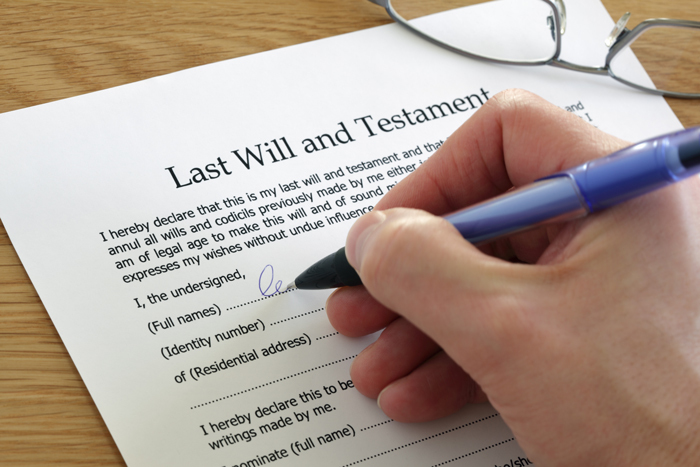
Tips for preparing a will
How to draft your will
While the rules vary across the states, there are some common things to keep in mind when you’re drafting a will, whether you’re using a will kit or not:
- You must be at least 18 years old or married. The will must be in writing, and you must be of sound mind and understand the implications of making a will.
- Be clear. Rather than simply writing ‘my spouse’, state their full name.
- Your will must be signed in the presence of two witnesses, who also need to sign the will in your presence. It’s best for the witnesses and the will-maker to also sign each page and to use the same pen. Also, ensure the witnesses aren’t beneficiaries or the spouse of a beneficiary.
- Appoint an executor. The executor’s job can be onerous and time-consuming. For example, the executor may need to apply to the Supreme Court for probate – a formal document to get permission to administer your estate, lodge a tax return and establish any trusts (for example, if you have young children).
- Appoint a substitute executor just in case, such as another family member or a trusted friend.
- Update your will when your circumstances change. A new de-facto relationship, marriage, separation or divorce, having a baby, the death of a beneficiary or your executor becoming unavailable are some common examples. As a rule of thumb, review and update your will every three to five years.
- Get legal advice if your affairs are complicated. This can cost anywhere between $400 and $1100 (for a set of standard wills for a couple).
- Keep your will in a safe place.
Why is it important to consider superannuation, tax and debt when making a will?
Andrew Simpson says superannuation needs special consideration during the will-making process because it’s a significant resource that may not automatically be considered part of your estate.
“It’s important because usually, apart from the family home, it’s [a will-maker’s] next biggest financial resource [and] you want to make sure it goes in the right direction,” he explains.
Consider the payment of certain debts, such as a mortgage on a property, and how these will be dealt with after you pass away
“Via your binding nominations, you can actually direct the trustee of your super fund to pay it where you want, so in circumstances where you’re looking to direct more benefit to one particular person or not benefit another, you can use your superannuation to do that quite effectively,” he adds. “Whereas if you haven’t turned your mind to your super, it may not land where you want it to.”
He says the tax impacts of how you distribute your estate are also good to take into consideration, if mainly to make things easier for those you’re going to leave your assets to.
“The tax treatment of certain assets is different … typically someone says: I want to give my family home to Child A and my investment property to Child B, [but] they have different tax consequences, because one of them is exempt from capital gains tax and one of them is not. So it’s just important to understand the tax outcome of a particular distribution when you’re preparing your will.”
It can also be important to consider the payment of certain debts, such as a mortgage on a property, and how these will be dealt with after you pass away.
When should you get legal advice for your will?
Andrew recommends talking to a lawyer about your will and estate plans if your financial and family situation is not relatively straightforward.
“If your circumstances are beyond the standard, you really should be getting some advice,” he suggests.
“If you’ve got a family trust, self-managed super, or a significant portfolio in your own name, or if your family circumstances are complex and you have a blended family – those scenarios really justify getting proper legal advice.”
Will kits and your data
As mentioned previously, several of the kits we’ve included in our comparison are entirely digital products that require you to input details about yourself in the course of building your will.
CHOICE is investigating how businesses use consumer data and recommends will-makers consider what a platform might do with their personal information.
Setting up a will requires disclosing intimate information about yourself and others – and like other businesses, will-kits can be opaque on how this data is exactly used
CHOICE senior campaigns and policy adviser Rafi Alam
“Consumers should be aware that online will-kits have different privacy policies on how they collect and use your personal information,” says CHOICE senior campaigns and policy adviser Rafi Alam.
“These can include analysing your data for market research, tracking your web usage to send you targeted advertising, or sharing or collecting personal information to and from third parties.”
“Setting up a will requires disclosing intimate information about yourself and others – and like other businesses, will-kits can be opaque on how this data is exactly used.”





